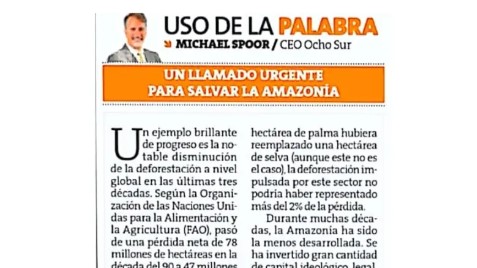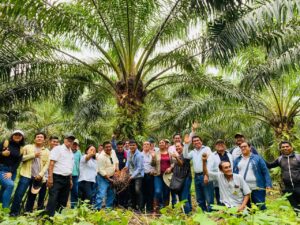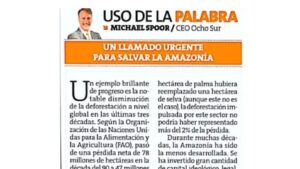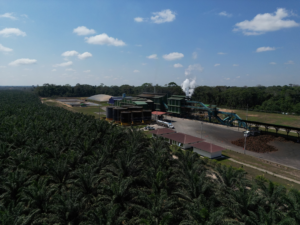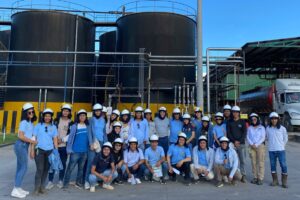It is urgent to save the Peruvian Amazon as it has been neglected for many decades and remains the least developed region of the country. A great deal of ideological, legal, political and financial capital has been invested in building walls that have isolated it from the rest of the world, slowing its economic development and, as a result, favoring illicit activities and deforestation.
This is stated by Michael Spoor, executive director of the company Ocho Sur, dedicated to the sustainable production of oil palm products and by-products in Ucayali, in his opinion column published in the newspaper Perú 21, where he demystifies with unobjectionable data the causes of deforestation and proposes integrating the Amazon into the world through best practices to overcome poverty and protect the forest.
In his article, he points out that a shining example of progress is the notable decrease in global deforestation in the last three decades, noting that, according to the Food and Agriculture Organization of the United Nations (FAO), it decreased from a net loss of 78 million hectares in the 1990s to 47 million hectares in the most recent decade (2010 to 2020).
“At the per capita level, the data is even more striking: Our World in Data reported that greenhouse gas emissions derived from “land use change and deforestation” decreased by 55 %, from 0.33 tons per person in 1990 to 0.15 tons per person in 2020,” he states.
The CEO of Ocho Sur further indicates that Peru has been a notably different case in the same period, as greenhouse gas emissions derived from “land use change and deforestation” did not decrease by even 1 %. Why has Peru performed so poorly in this regard?
“Some stakeholders try to deceive the public and make them believe that agribusiness, particularly oil palm, is the main culprit. However, the data show the opposite: Over three decades, Peru lost 4.5 million hectares of its rainforests (according to MINAM), while, at the end of that period, MIDAGRI states, the entire oil palm sector covered less than 100,000 hectares, with more than half of the areas cultivated by small farmers who were previously dedicated, in large part, to coca leaf cultivation,” argues Michael Spoor.
He adds that even in the hypothetical scenario where each hectare of palm would have replaced one hectare of primary forest (which is clearly not the case), deforestation driven by this sector could not have accounted for more than 2 % of the total loss.
In this context, he states that, for many decades, the Amazon has been the least developed region, with a large amount of ideological, legal, political and financial capital invested in building walls that have isolated it from the rest of the world, wrongly assuming that this was the best way to protect the forest. This has only brought the opposite: more poverty, more informality, more illegal activities, and, therefore, more forest loss.
“Certain problematic non-governmental organizations (NGOs), which benefit from the current status quo and promote conflicts, complaints and false narratives against formal and responsible private investment, hinder development and formalization opportunities in the Amazon,” he stresses.
Finally, Michael Spoor, emphasizes in his article that, as a civil engineer, he recognizes the importance of building bridges rather than walls, since there is evidence that the isolationist walls created by punitive policies and practices of the past have failed to protect the Peruvian Amazon and the planet.

